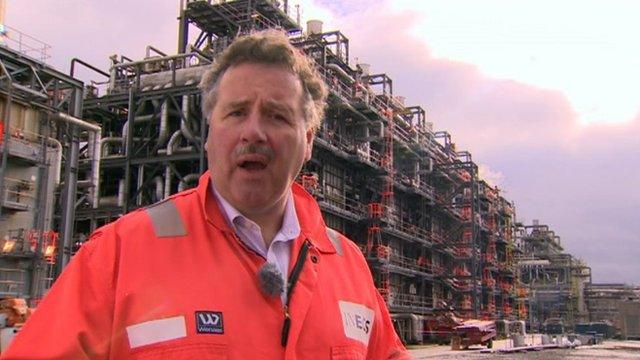Grangemouth plant future 'rests on shale gas industry'
- Published
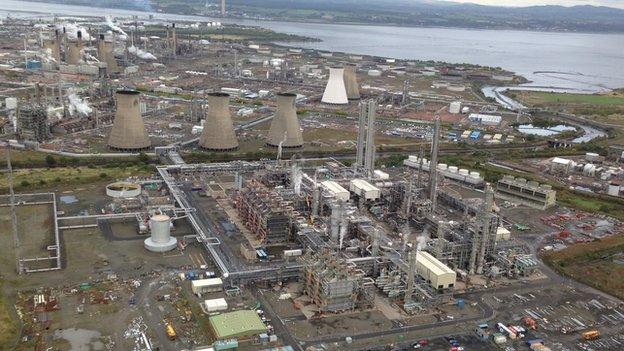
Ineos has invested in a project to work with shale gas imported from the USA at Grangemouth
The Grangemouth petrochemical plant is unlikely to have a long-term future unless a UK shale gas industry can develop, its owners have warned.
Chemicals giant Ineos wants to use shale gas as a raw material for its plants and has bought licences for gas exploration in central Scotland.
However, the Scottish government has imposed a moratorium on the "fracking" technique used to extract the gas.
Ineos has already invested in a project to import cheap shale gas from the USA.
However, Ineos Upstream chairman Gary Haywood said buying in the gas from abroad was not a long-term solution.
Speaking at a conference in Edinburgh, he said it would be feasible to get a shale industry up and running in the UK "within three to five years".
He said: "If you look forward five years, it is possible we could be producing gas from that point onwards.
"That would mean that we have some time to develop the resource and replace what we get from the US.
"Can we do that efficiently enough to make Grangemouth make sense in the future? That is a real challenge."
'Special situation'
Ineos has bought licences for shale gas exploration across 700 square miles (1,126 sq km) of land in central Scotland, but the government moratorium has left a question mark over the future of the industry locally.
When asked if the plant would have a future without an indigenous supply of gas, Mr Haywood said it would be "very difficult".
He said: "When you are shipping in material of that nature you are always at a disadvantage.
"It is a very special situation at the moment, with ethane being available in the US at very low prices, because of the rapid increase in production and the lack of demand in the US.
"That has meant we have been able to get that ethane at very, very cheap prices, relatively speaking.
"We can't see that going on. Unless we can develop an indigenous source, it is unlikely that the cracker at Grangemouth has a long-term future."
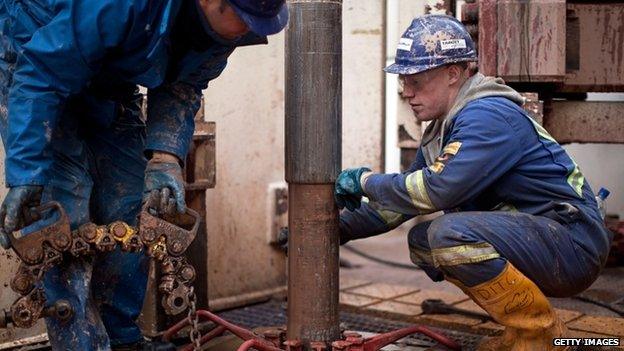
A moratorium on the "fracking" technique has been imposed by the Scottish government
Scottish Conservative energy spokesman Murdo Fraser said that it made "absolutely no sense" for Grangemouth to rely on shale gas from abroad, adding that shale gas had "revolutionised the US energy economy".
He said: "This warning shows just how crucial it is for Scotland not to be left behind on fracking.
"This vital plant has already been to the brink in recent years - we should take action now to ensure it doesn't return there any time soon."
'Poor, cold and green'
The conference in Edinburgh, titled "Is Scotland Ready for Fracking?", also heard from Gordon Hughes, a professor of economics at Edinburgh University and a former World Bank advisor.
He said the country needed to choose between being "poor, cold and green" or producing its own energy, and called for a "genuine debate" on the matter.
He said: "The Scottish government has very ambitious and understandable social welfare targets but these have got to be paid for, ultimately out resources that are generated within Scotland.
"The government have done enormously well out of oil and gas, but that is going away is not going to be a big resource in future.
"The question is what replaces it? We can be poor and we can be cold, or we need to produce energy for ourselves and take a share of the revenues in order to meet the objectives of the government.
"If in the end Scotland decided it wants to be cold and green that is fine, that is a choice it can reasonably make after having had a proper discussion, but on the other hand let's not wander in to that simply by ill-formulated and ill-thought-through political posturing."
Full control over fracking is due to be devolved to Scotland after May's general election.
A Scottish government spokesman said: "The consultation will allow everyone with a view on this issue to feed it into government.
"It is a logical next step in the careful and evidence based approach we have demonstrated to date, and is an example of our commitment to the community engagement which this government believes in.
"Industry bodies including Ineos and the UK Onshore Operators Group welcomed the opportunity to engage in the consultation and environmental organisations including Friends of the Earth Scotland and WWF Scotland also both welcomed the announcement."
- Published28 January 2015
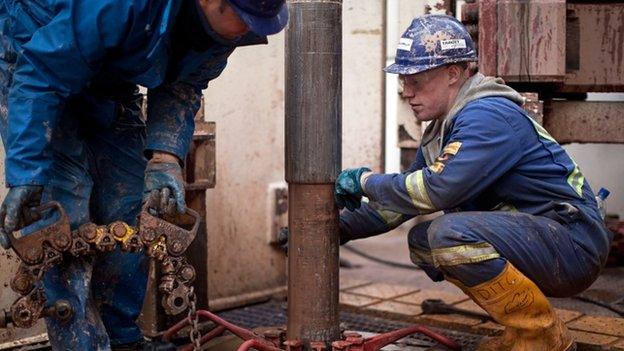
- Published20 November 2014
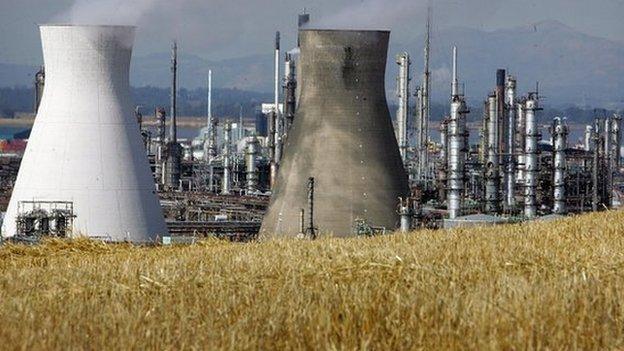
- Published26 February 2014
